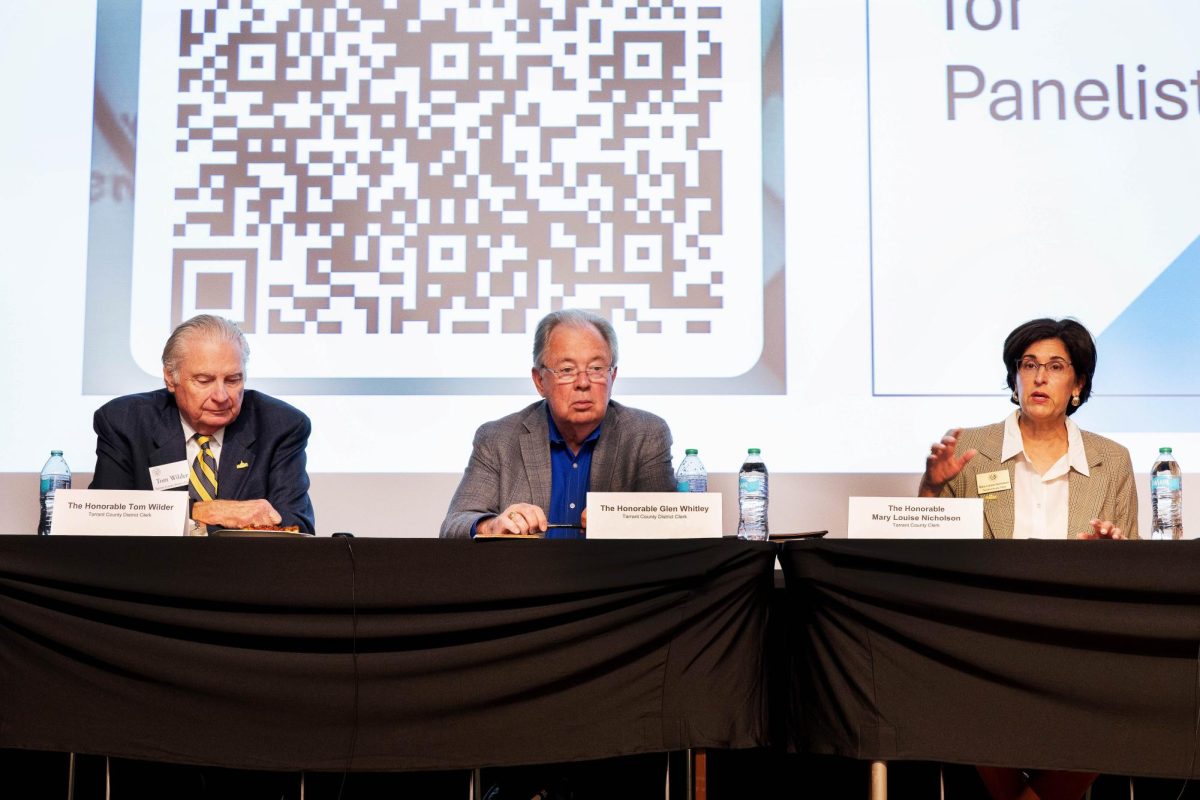
KELLY AMTOWER
Tarrant County District Clerk Thomas Wilder, retired County Judge Glen Whitley and County Clerk Mary Louise Nicholson explain county government Oct. 2.
Three current and former Tarrant County officials came to NE Campus Oct. 2 to talk to students about the inner workings of county government.
District Clerk Thomas Wilder, former County Judge Glen Whitley and County Clerk Mary Louise Nicholson made up the panel. Precinct 2 Commissioner Alisa Simmons was expected as well but did not attend.
At the event, Whitley said the county, with just over 2.2 million people, is the third largest in Texas and 15th in the country. He explained how the Commissioners Court is the leadership unit that takes care of county-wide policies like approving budgets.
“What county government does, really more than even cities and school districts, is we implement and put in motion what the federal and the state governments pass in the form of laws,” Whitley said.
Concerns over picking the right career path for college students were made by Wilder. He said it is better to pursue a two-year degree in something students like and can make more money with rather than just go to a four-year college for something less monetarily beneficial.
He shared the story of how his granddaughter has yet to pay off her college debt of $40,000.
“Well, I’ll just tell it like it is, a college degree isn’t worth what it once was,” he said. “She has two master’s and is a teacher. Teachers make about $60,000 a year, right? It ain’t worth the two master’s. But I told her, ‘If you’ll move back to Texas, Pawpaw will take care of your Ph.D., and you go into administration.’ That’s where the money is.”
Nicholson talked about how her department oversees public records and documents such as land, home, bank and city records as well as passports and marriage licenses.
“I say very few people are going to go through life as a citizen of Tarrant County without coming to see me. You will come to my office,” Nicholson said. “You may never see the sheriff. You may never see the district clerk. But you’re going to come do business with me, and I’ll tell you why. Because in the County Clerk’s Office, by the Constitution and statute, I’m responsible for life’s most important documents.”
Panelists answered some of the student questions asked through a Google Form accessed through a QR code, which was selected and read out loud by Leigh-Anne Regenold, a NE associate professor of government who helped organize the event.
Regenold said she preferred the QR code because she has seen inappropriate questions be asked in other events and gets more questions that way from students too nervous to stand up and ask.
“When I have elected officials on campus, I tend to prefer the QR code simply because I get more questions that way … but also because then, I’m protecting the college by making sure that we don’t have some very inappropriate [questions],” she said.
She emphasized the importance of governmental awareness for today’s students, not only at a national and state level but also at a local level. Regenold said she wanted to bring awareness to how county governments work differently than state governments.
“Students, especially younger students, tend to think about government, politics as the President of the United States, and often don’t realize that there are dozens of other people that they vote for or get the opportunity to vote for, and that have way more influence over the things that they do every day,” she said.
Some students said participating in this event encouraged them to explore county positions for themselves.
“We got some good intake from it, and we did some research of our own as they were talking, just to kind of follow up with what he was saying,” NE student Amanda Vaz said. “And yeah, think we got some questions answered for sure and what potential jobs we might not look into.”
Another NE student, Millicent Williams, who attended the event said her interest in law was piqued by Wilder’s discussion on felony courts and his responsibilities.
“I’ve always been curious about civil, criminal, felony courts and stuff like that,” she said. “So, they had a lot to say about that, and how many courts it was. I didn’t really know, but now I do know how many criminal courts, felony courts or whatever that they have.”